The Future of Chocolate The Science of Sweet Innovation
Chocolate is no longer just a guilty pleasure – it’s becoming a symbol of sustainability, health, and cutting-edge innovation. As consumer preferences shift toward vegan, sugar-free, and ethically sourced treats, the chocolate industry is undergoing a radical transformation.
But it’s not just about dietary trends. Climate change, rising cocoa prices, and ethical labor practices are pushing manufacturers to rethink how chocolate is made – from lab-grown cocoa to upcycled ingredients.
The future of chocolate isn’t just delicious – it’s responsible, high-tech, and wildly creative.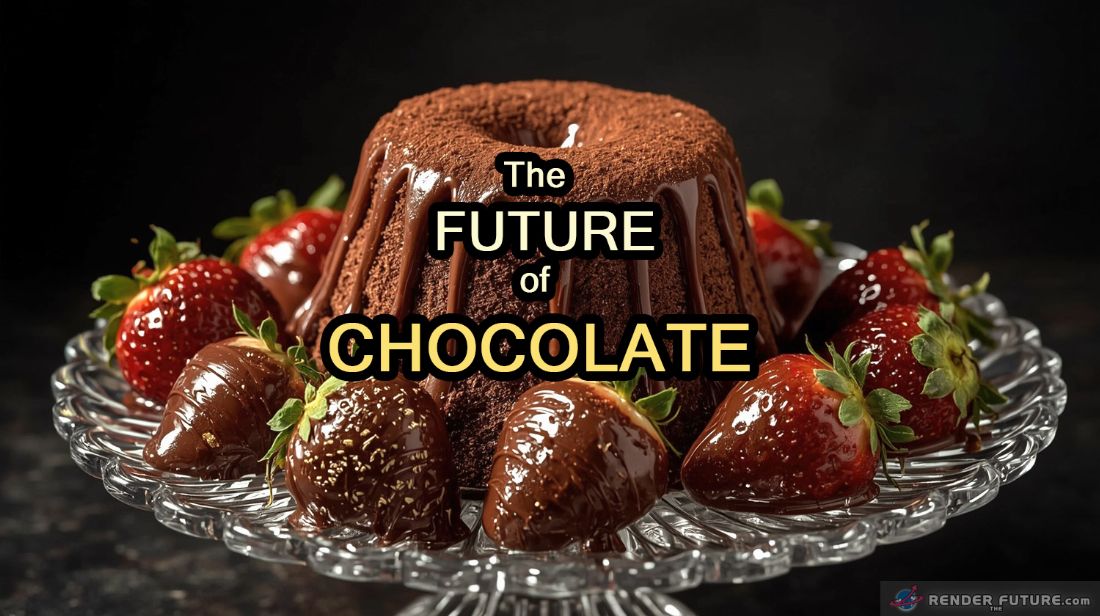
A Sweet Sci-Fi Dream Come True
Imagine biting into a piece of chocolate that not only melts in your mouth but also heals your body, shifts your mood, or even prevents a war. Sounds like science fiction? Think again. The chocolate industry is on the brink of a revolution so radical, it will redefine how we consume, experience, and even think about chocolate.
 From AI-crafted flavor explosions to mood-altering cocoa compounds, the future of chocolate is anything but ordinary. What was once a simple indulgence is morphing into a high-tech, health-boosting, and even world-peace-promoting superfood. Buckle up – because the chocolate of tomorrow is going to blow your mind.
From AI-crafted flavor explosions to mood-altering cocoa compounds, the future of chocolate is anything but ordinary. What was once a simple indulgence is morphing into a high-tech, health-boosting, and even world-peace-promoting superfood. Buckle up – because the chocolate of tomorrow is going to blow your mind.
AI & Robots: The Master Chocolate Chefs of Tomorrow
The End of Human-Made Chocolate?
Computational Intelligence isn’t just optimizing recipes – it’s inventing them. Chocolate factories of the future will be run by AI-powered robots that:
- Create never-before-seen flavor combinations (think “salted caramel with a hint of interstellar dust”)
- Adjust texture in real-time based on consumer feedback
- Predict trends before humans even know what they crave
 In futuristic chocolate factories, AI-powered robots don’t just assemble bars – they craft them with obsessive, inhuman precision. Equipped with machine vision and quantum taste sensors, these robotic chocolatiers analyze cocoa particles at a molecular level, adjusting tempering temperatures by 0.1-degree increments to achieve flawless crystalline structure.
In futuristic chocolate factories, AI-powered robots don’t just assemble bars – they craft them with obsessive, inhuman precision. Equipped with machine vision and quantum taste sensors, these robotic chocolatiers analyze cocoa particles at a molecular level, adjusting tempering temperatures by 0.1-degree increments to achieve flawless crystalline structure.
They 3D-print intricate bonbons with geometric perfection no human hand could replicate, while AI algorithms cross-reference global flavor databases to invent revolutionary new pairings—like yuzu-infused ruby chocolate with edible gold nano-flakes that crackle with static electricity.
Customization at Scale
Why settle for mass-produced bars when AI can craft a chocolate uniquely tailored to your DNA? Future vending machines might scan your biometrics and dispense a bar optimized for your mood, health, and taste preferences – all in seconds.
 Visualize a Michelin-starred chocolate lab where AI algorithms, trained on centuries of pastry techniques and molecular gastronomy, invent flavors no human palate could conceive – like a “volcanic dark chocolate” that releases a cooling menthol burst when it hits your tongue, or a “memory-evoking bonbon” that tastes uniquely like your childhood birthday cake.
Visualize a Michelin-starred chocolate lab where AI algorithms, trained on centuries of pastry techniques and molecular gastronomy, invent flavors no human palate could conceive – like a “volcanic dark chocolate” that releases a cooling menthol burst when it hits your tongue, or a “memory-evoking bonbon” that tastes uniquely like your childhood birthday cake.
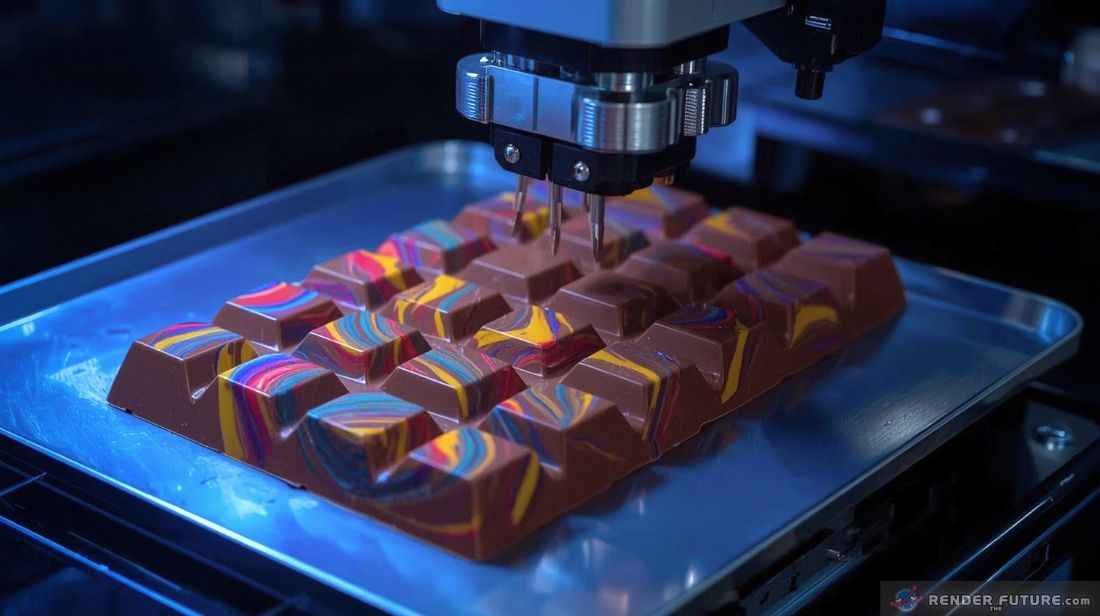 These robotic chocolatiers won’t just follow recipes – they’ll use machine learning to predict cultural craving shifts before they trend, crafting limited-edition bars for viral sensations (think “TikTok matcha-lime-chili swirl”) while optimizing textures through 3D-printed cocoa structures at a microscopic level. The most exclusive chocolates may soon bear a creator’s signature not from a chef, but from the AI model that dreamed them up – like “DALL-E Dark” or “GPT Ganache.”
These robotic chocolatiers won’t just follow recipes – they’ll use machine learning to predict cultural craving shifts before they trend, crafting limited-edition bars for viral sensations (think “TikTok matcha-lime-chili swirl”) while optimizing textures through 3D-printed cocoa structures at a microscopic level. The most exclusive chocolates may soon bear a creator’s signature not from a chef, but from the AI model that dreamed them up – like “DALL-E Dark” or “GPT Ganache.”
Taste That Lasts: The 60-Minute Chocolate Experience
The Problem with Today’s Chocolate
One of life’s great tragedies? The fleeting nature of chocolate’s taste. You savor a piece, and poof – it’s gone in minutes. But what if every bite of chocolate could unfold like a symphony on your tongue, with flavors evolving and lingering long after you’ve swallowed?
Scientists are pioneering “flavor-lock” technology using edible nano-capsules that release taste compounds in timed waves – first the bright top notes of raspberry, then the earthy cocoa depth, finally a whisper of ancient salt that lingers like a memory.
 These engineered chocolates could feature “taste amplifiers” activated by saliva, making each subsequent sip of water or coffee reignite the flavor profile anew. The result? A single square becomes a multi-sensory journey where time stretches and every minute brings a new delicious surprise – turning snack time into an event worth savoring.
These engineered chocolates could feature “taste amplifiers” activated by saliva, making each subsequent sip of water or coffee reignite the flavor profile anew. The result? A single square becomes a multi-sensory journey where time stretches and every minute brings a new delicious surprise – turning snack time into an event worth savoring.
How Science Is Fixing It
New encapsulation technology allows chocolate makers to slow-release flavor molecules, extending taste perception. Some experimental chocolates use:
- Time-release nanocapsules that burst at different intervals
- Flavor-enhancing emitters activated by saliva
- Temperature-sensitive compounds that evolve as you eat
Soon, you’ll enjoy a single bite of chocolate longer than an episode of your favorite show.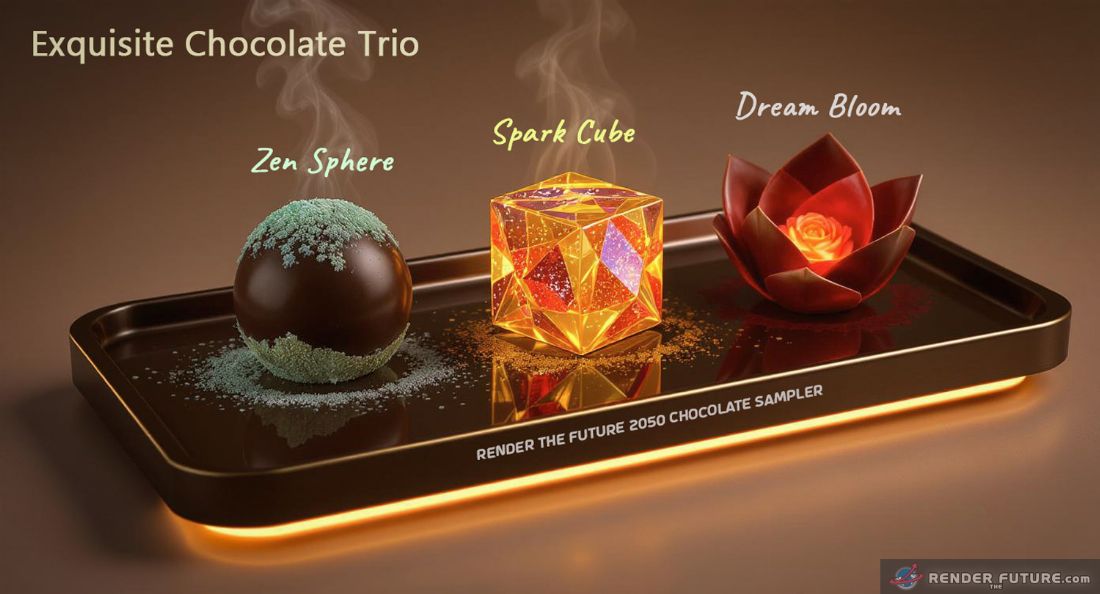
Sugar-Free Without Compromise: Tricking the Brain
The Death of Artificial Sweeteners
For decades, sugar-free chocolate has been a disappointing compromise. But the next generation of sweeteners doesn’t replace sugar – it hacks your taste buds.
The future of sugar-free chocolate won’t rely on artificial sweeteners or strange aftertastes – instead, it will hack our biology at the molecular level. Scientists are developing “taste modulator” compounds that temporarily reshape how our tongue’s sweetness receptors function, making even the darkest 100% cacao taste as sweet as milk chocolate without a single gram of sugar.
 These breakthroughs go beyond traditional sweeteners by using targeted phytochemicals that amplify natural cocoa flavors while silencing bitterness receptors. The most radical approach? Edible “taste buds reset” chocolates that gradually retrain your palate to prefer less sweetness – a potential game-changer for public health. Imagine indulging in rich, complex chocolate that satisfies your sweet tooth while actually improving your metabolic health with every bite.
These breakthroughs go beyond traditional sweeteners by using targeted phytochemicals that amplify natural cocoa flavors while silencing bitterness receptors. The most radical approach? Edible “taste buds reset” chocolates that gradually retrain your palate to prefer less sweetness – a potential game-changer for public health. Imagine indulging in rich, complex chocolate that satisfies your sweet tooth while actually improving your metabolic health with every bite.
Mood-Enhancing Chocolate: Eat Your Way to Happiness
Envision this: You’re having one of those days – your energy is lagging, your focus is scattered, and your mood could use a serious boost. Instead of reaching for another cup of coffee or mindlessly scrolling through your phone, you unwrap a sleek, futuristic chocolate bar specifically designed to lift your spirits.
This isn’t just wishful thinking – it’s the next frontier in functional foods.
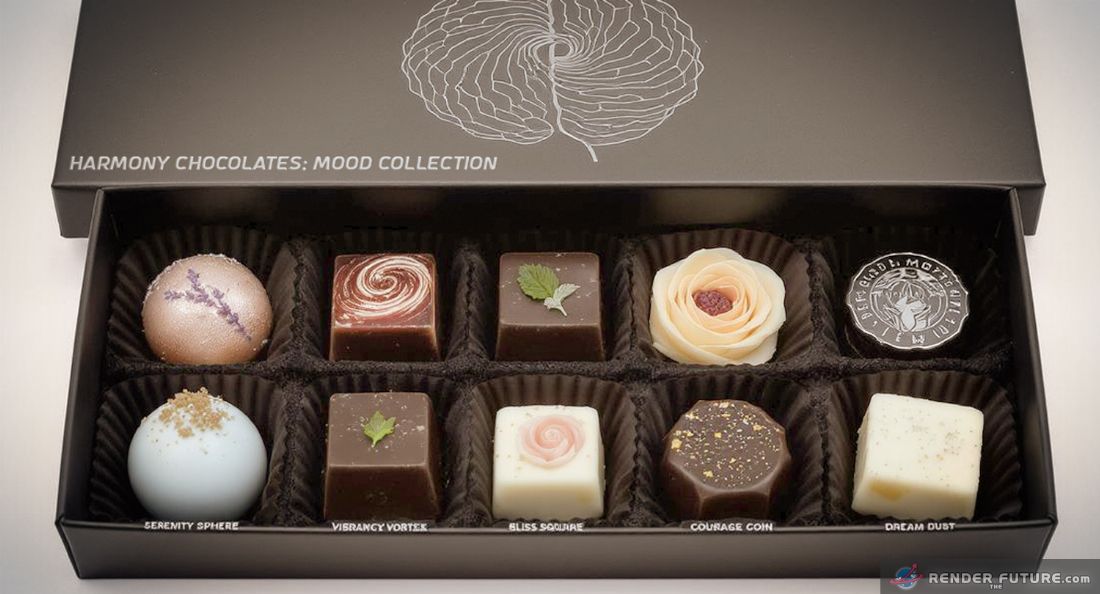
Scientists are now decoding exactly how cocoa compounds interact with our brain chemistry, paving the way for chocolates that do far more than provide a temporary sugar high.
These mood-modulating treats will contain precise blends of adaptogens, nootropics, and neurotransmitter precursors, offering targeted emotional support wrapped in delicious, craveable formats. From anxiety-soothing dark chocolate with ashwagandha to focus-enhancing mint-infused bars with lion’s mane mushroom, the line between confectionery and emotional wellness is about to disappear – one blissful bite at a time.
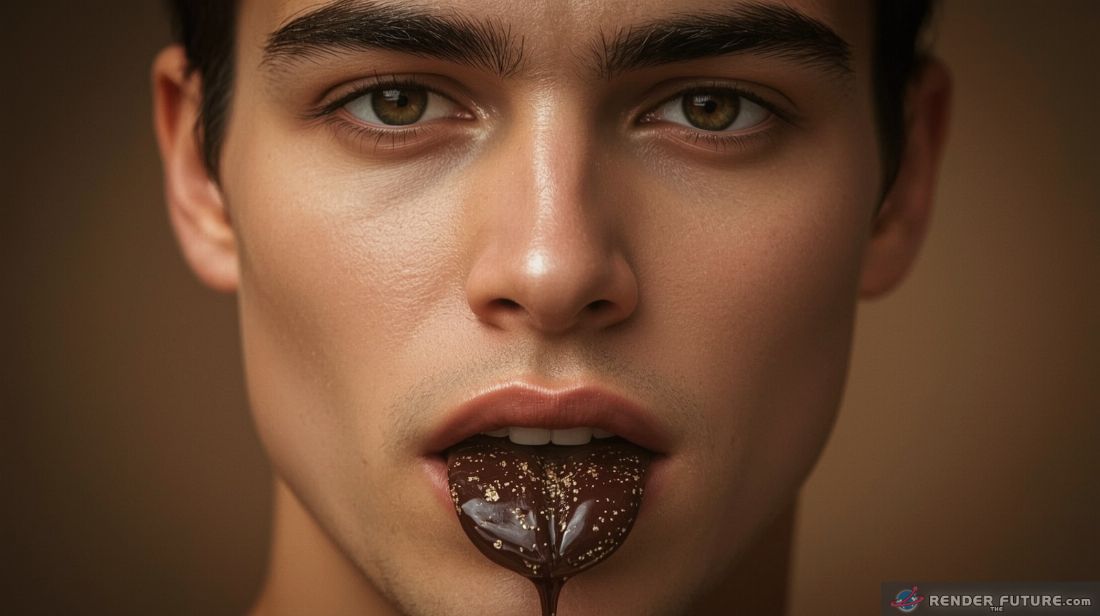 Feeling sluggish? Stressed? Unfocused? Instead of coffee or energy drinks, you might reach for a neurotransmitter-tuning chocolate bar.
Feeling sluggish? Stressed? Unfocused? Instead of coffee or energy drinks, you might reach for a neurotransmitter-tuning chocolate bar.
Future chocolates will be formulated to:
- Boost energy (better than caffeine, without the crash)
- Induce calm (bye-bye, anxiety meds)
- Enhance focus (like Adderall, but delicious)
The Science of Flavor & Emotion
By combining cocoa with adaptogens, nootropics, and mood-stabilizing compounds, chocolate will become the ultimate edible therapy.
Chocolate as Medicine: Healing with Every Bite
The Rise of Functional Chocolate
 Forget pills – soon, your doctor might prescribe chocolate. Scientists are unlocking cocoa’s hidden potential, engineering it to deliver targeted health benefits. Chocolates infused with DNA-modifying compounds that repair cells, reduce inflammation, or even reverse chronic diseases.
Forget pills – soon, your doctor might prescribe chocolate. Scientists are unlocking cocoa’s hidden potential, engineering it to deliver targeted health benefits. Chocolates infused with DNA-modifying compounds that repair cells, reduce inflammation, or even reverse chronic diseases.
Researchers are already developing chocolates that:
- Boost serotonin to combat depression
- Enhance cognitive function with neuroprotective flavonoids
- Regulate blood sugar for diabetics without artificial sweeteners
From Antioxidant Powerhouse to Targeted Therapy
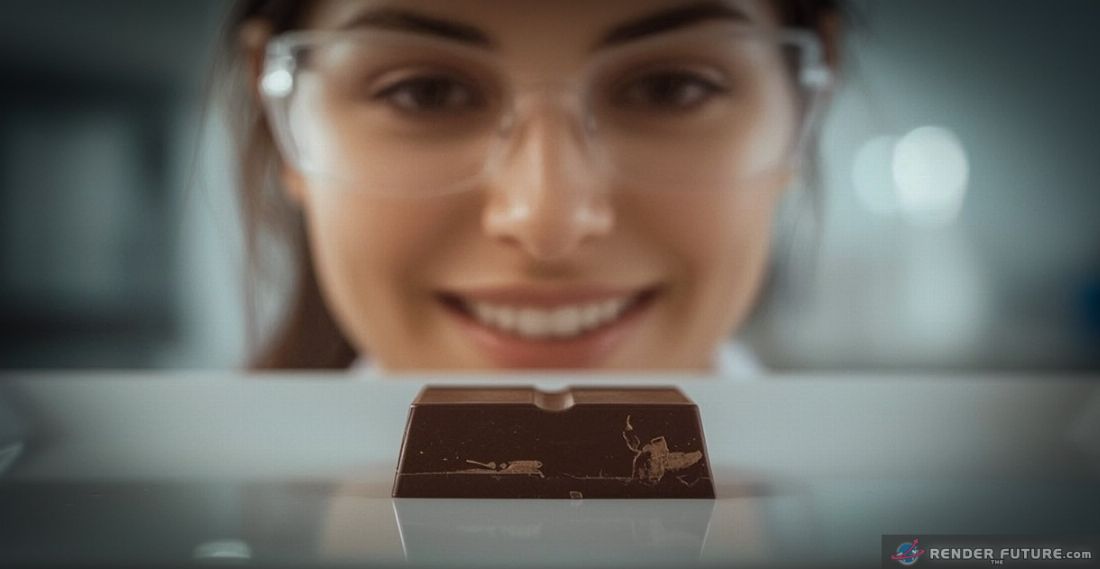 While dark chocolate’s heart-healthy flavonoids are well-known, future iterations could go far beyond general wellness. Researchers are experimenting with cocoa-derived nanocarriers that deliver drugs directly to diseased cells – think chemotherapy or insulin packaged in a velvety dark chocolate square.
While dark chocolate’s heart-healthy flavonoids are well-known, future iterations could go far beyond general wellness. Researchers are experimenting with cocoa-derived nanocarriers that deliver drugs directly to diseased cells – think chemotherapy or insulin packaged in a velvety dark chocolate square.
There’s even work on chocolate-infused transdermal patches for slow-release pain relief. And for mental health? Pioneering studies suggest psilocybin-infused chocolate microdoses could treat depression with fewer side effects than pharmaceuticals. The ultimate goal? Turning the world’s favorite comfort food into a precision tool for longevity and healing – one delicious bite at a time.
The Sweet Science Behind It
By isolating bioactive compounds in cocoa and enhancing them through precision fermentation, future chocolates could act like personalized medicine. A square of dark chocolate might one day replace your multivitamin, painkiller, or even your antidepressant.
Pharmacies of the Future
Chocolate as the New Prescription
It will be a world where, when you walk into a pharmacy, the first thing you see isn’t rows of pill bottles – but gleaming displays of artisanal chocolate bars, each labeled like precision medicine. “Take two squares daily for stress relief,” reads one wrapper; “For immune support, dissolve on tongue,” advises another.
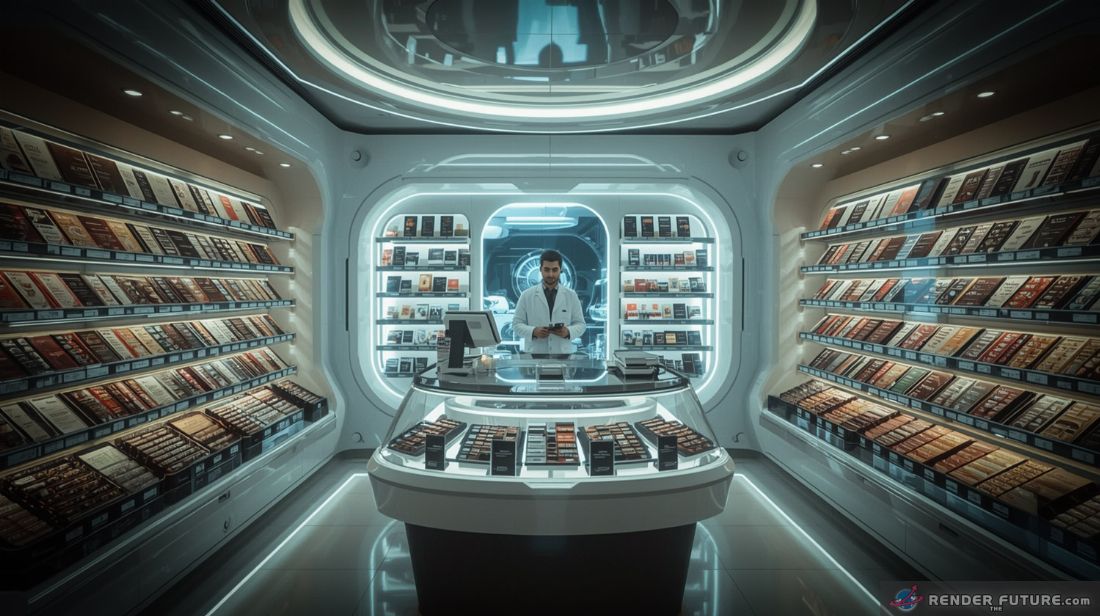 These aren’t mere supplements but FDA-approved chocolate therapeutics, formulated with bioactive cocoa compounds, targeted probiotics, and nano-encapsulated vitamins. Pharmacists now customize chocolate “scripts” based on your microbiome and DNA, blending 85% dark chocolate with adaptogens for anxiety or lion’s mane mushroom for focus—all while satisfying cocoa cravings.
These aren’t mere supplements but FDA-approved chocolate therapeutics, formulated with bioactive cocoa compounds, targeted probiotics, and nano-encapsulated vitamins. Pharmacists now customize chocolate “scripts” based on your microbiome and DNA, blending 85% dark chocolate with adaptogens for anxiety or lion’s mane mushroom for focus—all while satisfying cocoa cravings.
Clinical trials show patients adhere to chocolate-based regimens 300% more than traditional pills. The side effect? A healthcare system where healing doesn’t just work—it tastes like a luxury experience.
Chocolate for World Peace? The Ultimate Conflict Resolver
The Boldest Idea Yet
What if chocolate could stop wars? Far-fetched? Maybe. But research suggests certain cocoa compounds promote empathy and cooperation.
Imagine diplomats sharing “Peace Bars” during tense negotiations. Governments might one day deploy chocolate as a diplomatic tool – because nothing disarms hostility like shared decadence.
Just visualize a scene of a high-stakes diplomatic summit where tensions are rising, voices are escalating, and negotiations appear on the verge of collapse. Suddenly, an aide enters with an ornate box of specially formulated “Diplomacy Delights” – chocolates infused with scientifically-proven empathy-boosting compounds. As world leaders reluctantly accept the offering, something remarkable happens: shoulders relax, eye contact softens, and the conversation takes a more collaborative turn.
 This isn’t fantasy – neuroscientists have discovered that certain cocoa flavonoids combined with oxytocin precursors can lower defensive reactions and enhance social bonding. The United Nations is already piloting “conflict resolution chocolate” in mediation sessions, while tech startups are developing AI-designed “peace bars” tailored to cultural taste preferences.
This isn’t fantasy – neuroscientists have discovered that certain cocoa flavonoids combined with oxytocin precursors can lower defensive reactions and enhance social bonding. The United Nations is already piloting “conflict resolution chocolate” in mediation sessions, while tech startups are developing AI-designed “peace bars” tailored to cultural taste preferences.
From corporate boardrooms to international treaties, the future might see chocolate not just as a truce symbol, but as an active tool for human harmony – proving that sometimes, the path to peace really is paved with chocolate.
While it won’t solve everything, chocolate could become a symbol of unity – a delicious reminder that we’re all human.
Sustainability Crisis: Can Chocolate Survive Climate Change?
The Cocoa Apocalypse?
Cocoa trees are highly vulnerable to climate shifts, with rising temperatures and droughts threatening global supply. Some estimates suggest chocolate could become a luxury item by 2050 if farming doesn’t adapt.
Just for a minute, visualize walking into a gourmet chocolate shop in 2050, only to find the shelves half-empty and prices triple what they once were. This dystopian scenario could become reality as climate change threatens the very existence of cocoa trees. Rising temperatures, prolonged droughts, and aggressive fungal diseases are already devastating West African cocoa farms – where 70% of the world’s chocolate originates.
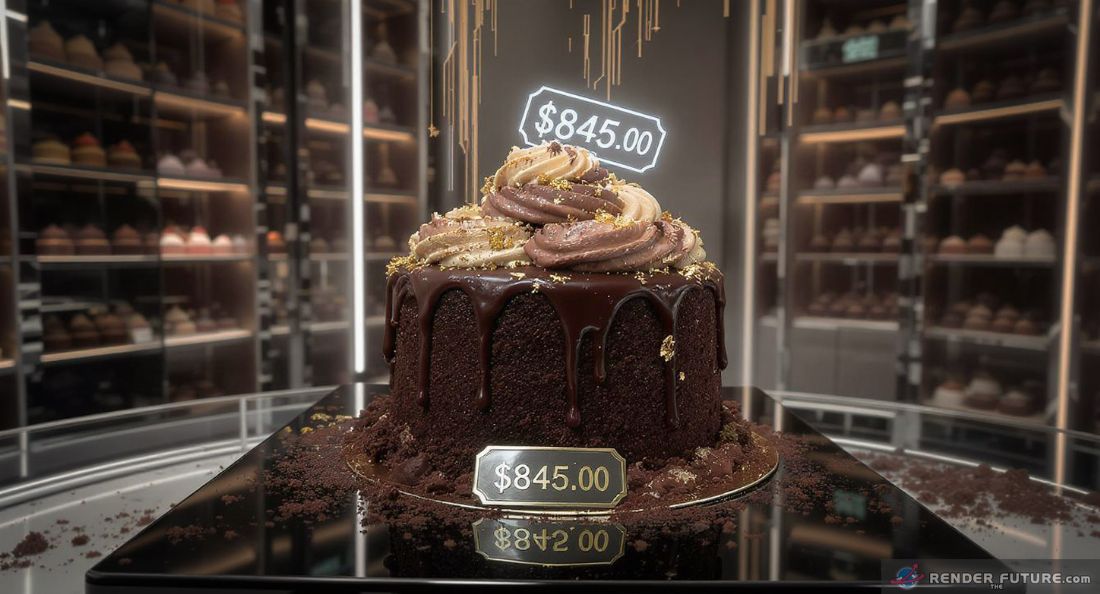 Farmers in Ivory Coast and Ghana report harvests declining by up to 40% in recent years, while scientists warn that traditional cocoa-growing regions may become completely unsuitable within decades. But from this crisis emerges extraordinary innovation: geneticists are developing heat-resistant “super cocoa” hybrids, vertical farming startups are experimenting with indoor cocoa cultivation, and biotech firms are pioneering lab-grown cocoa cells that require no farmland at all.
Farmers in Ivory Coast and Ghana report harvests declining by up to 40% in recent years, while scientists warn that traditional cocoa-growing regions may become completely unsuitable within decades. But from this crisis emerges extraordinary innovation: geneticists are developing heat-resistant “super cocoa” hybrids, vertical farming startups are experimenting with indoor cocoa cultivation, and biotech firms are pioneering lab-grown cocoa cells that require no farmland at all.
The race to save chocolate is sparking a agricultural revolution – one that might not just preserve our favorite treat, but transform how we grow food in an era of climate chaos.
Innovative Solutions to Save Chocolate
To combat this, scientists and startups are exploring:
- Drought-resistant cocoa hybrids
- Lab-grown cocoa cells (no farms needed!)
- Cocoa alternatives from carob, jackfruit seeds, or even mushroom-based “chocolate”
Concerns & Challenges: The Dark Side of the Chocolate Revolution
Ethical Dilemmas & Over-Reliance
With great power comes great responsibility. As we stand on the brink of this chocolate renaissance, we must confront uncomfortable questions: What happens when our comfort food becomes a controlled substance?
The same neuro-targeting technology that could make chocolate a force for good might also open doors to dangerous manipulation – imagine corporations engineering chocolates to be chemically addictive, or governments subtly dosing populations with compliance-inducing compounds through everyday treats.
Already, legal battles are brewing over who owns these bioengineered cocoa formulas – multinational corporations or the West African farmers whose ancestors cultivated cacao for centuries? And in our rush to future-proof chocolate, are we creating a two-tier system where only the wealthy can afford real, artisanal cocoa while the masses get lab-grown substitutes?
The chocolate revolution brings tremendous promise, but without ethical guardrails and equitable access, we risk turning humanity’s oldest comfort food into yet another vector of inequality and control.
Balancing Innovation & Ethics
The key? Regulation, transparency, and keeping chocolate accessible and ethical. The future of chocolate should be delicious, revolutionary, and fair for all.
Conclusion: A Future Worth Tasting
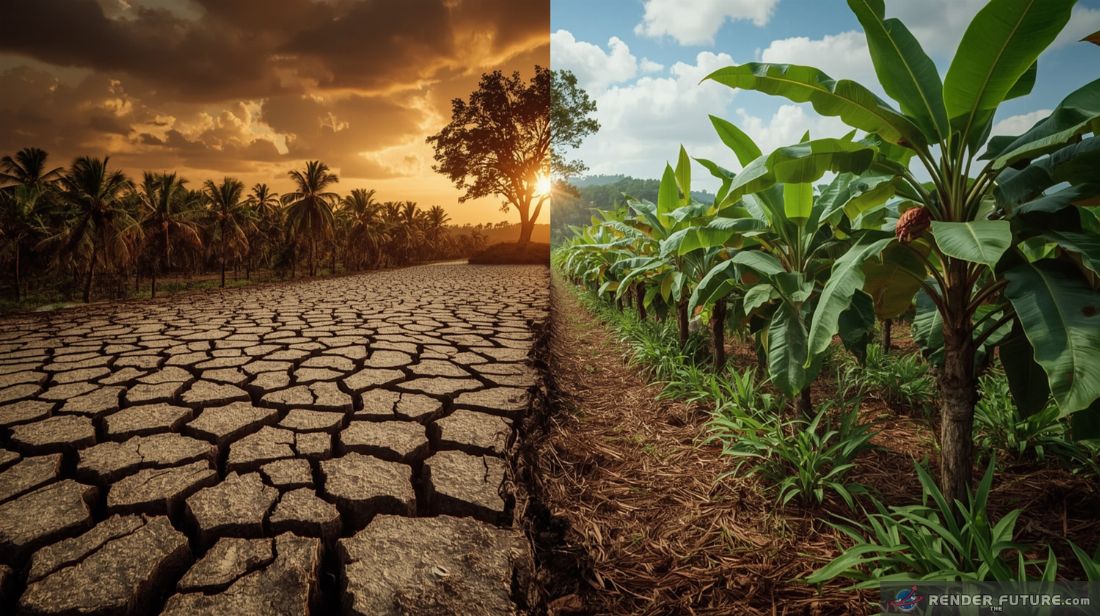 The chocolate of tomorrow isn’t just food – it’s medicine, technology, and even diplomacy wrapped in a delicious package. While challenges remain, the possibilities are as endless as they are exciting.
The chocolate of tomorrow isn’t just food – it’s medicine, technology, and even diplomacy wrapped in a delicious package. While challenges remain, the possibilities are as endless as they are exciting.
The chocolate industry is at a crossroads – evolving or collapsing. But with innovation, sustainability, and ethics leading the way, the future looks decadent, diverse, and delicious.
So, the next time you enjoy a piece of chocolate, remember:
This is just the beginning.
 The sweetest revolution is yet to come.
The sweetest revolution is yet to come.

References and Sources
- “The Medicinal Potential of Cocoa Flavonoids” – Journal of Nutritional Science
A deep dive into how cocoa compounds can treat chronic diseases.
https://www.journalofnutrition.org/ - “AI in Food Manufacturing: The Next Frontier” – Future of Food Tech
How artificial intelligence is reshaping chocolate production.
https://www.futurefoodtech.com/ - “Sweet Lies: How New Compounds Trick the Brain” – Science Advances
The science behind sugar-free sweetness perception.
https://www.scienceadvances.org/









